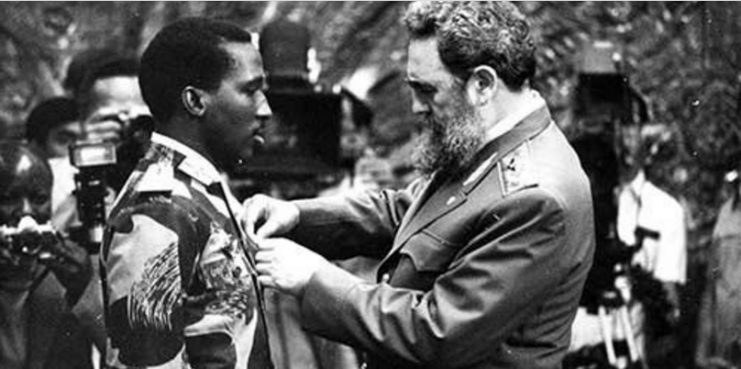What Africa Should Learn From The Marxists – Thomas Sankara & Fidel Castro – Inspired by the Communist Manifesto by Karl Marx and Friedrich Engels, published in 1848, the world still upholds the legacies of notable Marxism disciples like late world acclaimed Fidel Castro and Africa’s own Thomas Sankara.
Peter Osborne describes the manifesto as “the single most influential text written in the nineteenth century”. The Marxist ideology condemned the ills of capitalism, which was spiraling out of control.
Capitalism came up in the 17th century, with emphasis centered on the right to private property. This concept made the rich richer while the poor got poorer.

As Castro said:
“Capitalism has no moral and ethical value, everything is for sale. It is impossible to educate people in such an environment, People become selfish and sometimes turn into bandits.”
Sadly this tendency has not ceased. It is still very much obtainable in most nations of the world, Africa not excluded.
One thing that is for sure is that when oppression goes on for so long it never poses a surprise when it gives birth to a full-blown revolution. This was the case with all revolutionary stories around the world.
African nations assume that the continent is increasingly running a democratic government; however the fruits of the much revered form of governance does not justify the system.
With the exodus of the imperialists from African nations, social equality was still as far fetched as it never used to be till colonialism.
Capitalism did not appear as a demon all of a sudden. No, it came with technological growth and other economic prospects, but then at the expense of the working class. It is worthy to mention that the working/middle class is the economic power house of any nation.
Placing it side by side to some African countries, it should be a reminder that the more things go wrong with the distribution of wealth, the more chances there are for a revolution to occur.
Take for instance issues of unemployment. These days we have leaders who fail the people with pride and no apologies. And who would rather stash billions of dollars away while deceiving millions of Africans that “times are hard”.
Instead of setting up industries and enterprises that will take citizens off the streets for good, they invest in ventures that are only beneficial to their pockets. Embezzlement in Africa is just a crime listed out on paper, it is the norm and order of the day.
The abuse of these working class introduced the gross injustices and corruption that Sankara and Castro stood up against.
It is rather striking that at 33 Thomas Sankara, the son of a World War II veteran had become Burkina Faso’s president; while at At age 32, Castro had become the youngest leader in Latin America.
See Also: Doing Business in Africa: Ten Things No One Ever Told You
Sankara, popularly called the ‘Che Guevara’ of Africa, was the leader of the popular revolutionary government in the West African country of Burkina Faso from 1983 to 1987. He obviously adopted the ways of Fidel who is considered the grand patriot of all successful revolutions around the world in the 19th century.
“Che Guevara taught us we could dare to have confidence in ourselves; confidence in our abilities. He instilled in us the conviction that struggle is our only recourse. He was a citizen of the free world that together we are in the process of building. That is why we say that Che Guevara is also African.”
One thing that the two vehemently fought was the capitalist ideology and the disordered social strata that came with it. They wanted equality for all – rich and poor alike. They nationalized all properties on becoming the leaders of their respective nations.
3 decades after the Cuban revolution came Sankara’s revolution in Burkina faso, however short lived. This is proof enough that ideologies sustain for centuries.
Please rate this artcle





